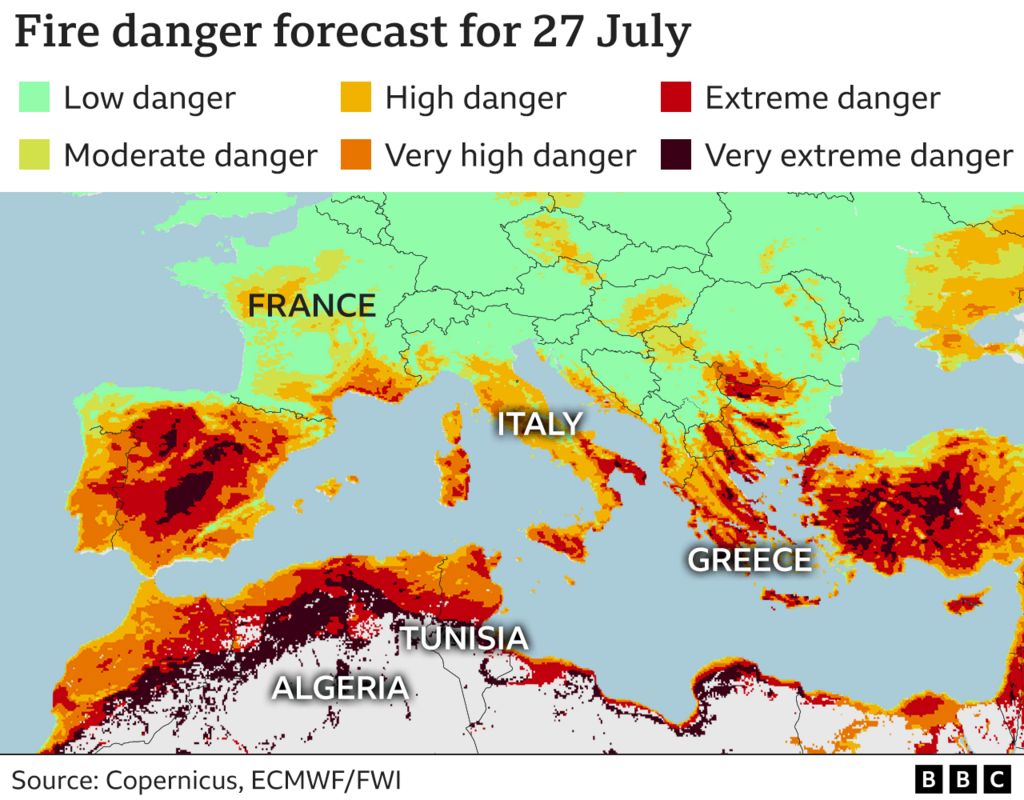This video can not be played
To play this video you need to enable JavaScript in your browser.
Evacuation orders have been issued for areas close to two central Greek cities threatened by new outbreaks of wildfires.
Citizens in areas around Volos and Lamia have been told to move to safety as the country remains in the grip of a severe heatwave.
Meanwhile, fires continue to rage on the islands of Rhodes, Corfu and Evia.
Greece is one of a number of countries currently grappling with wildfires, in which more than 40 people have died.
Kostas Agorastos, mayor of Greece’s Thessaly region, which includes Volos, has accused “brainless workers” of starting the fire, according to the Ellada 24 news channel.
He added that it had broken out on four simultaneous fronts.
In Rhodes, where a state of emergency is in place and from where thousands of tourists have been forced to flee, high winds have continued to fan the flames and villages remain at risk.
Some firefighters, who have been battling the blazes for days, have begun to lose hope.
“Every day, every night, we are here and we achieve nothing,” Savas Filaderis, who is from Rhodes, told the Reuters news agency.
“We can’t stop it,” he said.
“Everybody, all the people, they fight. The civil people, the government, they are but… for nothing. I believe we fight for nothing.”
In southern Italy, fires in Sicily and Puglia have also been fuelled by high winds and tinder-dry vegetation, meaning firefighters have been struggling in many areas to douse the flames and create firebreaks.
The church of St Benedict the Moor in the Sicilian city of Palermo was among the buildings that have been destroyed in the fires.
“The damage is enormous,” said Vincenzo Bruccoleri, superior friar of the convent.
Enrico Trantino, the mayor of Catania, another city on the island, told the BBC the high temperatures had melted underground electrical cables, which had left parts of the city without power and water.
However, Italy is expected to become much cooler in the coming days, according to BBC Weather.
The heaviest death toll so far is in Algeria, with more than 30 victims, including 10 soldiers surrounded by flames during an evacuation in the coastal province of Bejaia, east of Algiers.
Most of the fires have now been contained.
In neighbouring Tunisia, the country’s Interior Minister, Kamel Feki, said on Wednesday that all of the wildfires were under control and there had been no loss of life.
The European Commission, the executive body of the European Union, said support was being sent to affected countries, including Tunisia and Greece.
But Yamina Saheb, lead author on the United Nations’ climate change panel, known as the IPCC, told the BBC that people in the African region felt they were being left to fend for themselves without international help.
“People are scared and they don’t really understand why there is no international help,” she said.
Ms Saheb said she had spoken to friends and colleagues in the affected areas, who were finding it hard to understand why there was no European aid when they were so close to the continent.
“They say, if the situation gets worse, what are we going to do? Are we going to die, all of us? Is Africa going to die because of climate change, and Europe will be watching that, just watching and not doing anything?”
This video can not be played
To play this video you need to enable JavaScript in your browser.
The EU has also said it wants to sign contracts for up to 12 firefighting planes in order to improve its ability to fight blazes fuelled by climate change. These would be the first it would fully own.
A team of climate scientists – the World Weather Attribution group – said this month’s intense heatwave in Southern Europe, North America and China would have been virtually impossible without human-induced climate change.
- Two pilots die in Greek firefighting plane crash
- How climate change affects heatwaves and wildfires
- Wildfires in Greece in pictures
The fires have dealt a blow to the summer tourism industry, especially in Greece, where the industry accounts for one in five jobs and is vital for Rhodes and many other islands.
Holiday firms Jet2 and Tui have cancelled departures to the island for the coming days.
Tui said that it had already brought hundreds of people home, while hundreds more were expected to make it back to the UK on Wednesday.
The UK Foreign Office has not advised against travel to the affected parts of Greece, but has urged tourists to check with tour operators for updates.
Thousands of people have also been evacuated on Evia and Corfu, while Crete – another major holiday destination – is on high alert.
Other European countries have not escaped the heatwave unscathed. Portugal, Croatia and the French Mediterranean Island of Corsica are among other places that have experienced wildfires in recent days.

How have you been affected by the wildfires? If it is safe to do so, you can share your experiences by emailing [email protected].
Please include a contact number if you are willing to speak to a BBC journalist. You can also get in touch in the following ways:
- WhatsApp: +44 7756 165803
- Tweet: @BBC_HaveYourSay
- Upload pictures or video
- Please read our terms & conditions and privacy policy
If you are reading this page and can’t see the form you will need to visit the mobile version of the BBC website to submit your question or comment or you can email us at [email protected]. Please include your name, age and location with any submission.
Related Topics
- Europe heatwaves
- Greece
- Wildfires
- Climate change
- Italy
- Greece wildfires
